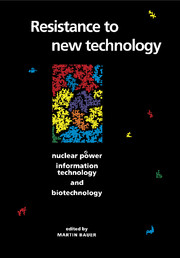Book contents
Preface
Published online by Cambridge University Press: 06 July 2010
Summary
This book combines contributions from a conference on ‘Resistance to New Technology – Past and Present’, held at the Science Museum, London, on 5–7 April 1993. The event brought together historians, sociologists, political scientists, media researchers and psychologists to reflect on the problem of ‘resistance’ in relation to technological developments. Around 150 people from twenty countries gathered in the unusual setting of steam engines, automobiles and space rockets provided by the Science Museum.
The aims of the meeting were (a) to take stock of the forms and effects of resistance in the recent past; (b) to compare different technologies in this context; and (c) to think about, and work towards, a functional analysis of resistance in the process of technological development. The meeting provided material to overcome the technocratic bias according to which resistance is nothing but a nuisance in the technological process.
When comparing the forms and effects of resistance the book focuses on three major developments since 1945: nuclear power, computing and information technology, and biotechnology. The story told is mainly, but not exclusively, European. In making comparisons the contributions reach out historically to the origins of the idea of ‘progress’ and the Luddite revolt of the early nineteenth century, and geographically to Australia, North America and Japan. The scope of the book prohibits the inclusion of several dimensions of the problem of resistance worth mentioning.
Information
- Type
- Chapter
- Information
- Resistance to New TechnologyNuclear Power, Information Technology and Biotechnology, pp. xiii - xivPublisher: Cambridge University PressPrint publication year: 1995
Accessibility standard: Unknown
Why this information is here
This section outlines the accessibility features of this content - including support for screen readers, full keyboard navigation and high-contrast display options. This may not be relevant for you.Accessibility Information
- 1
- Cited by
